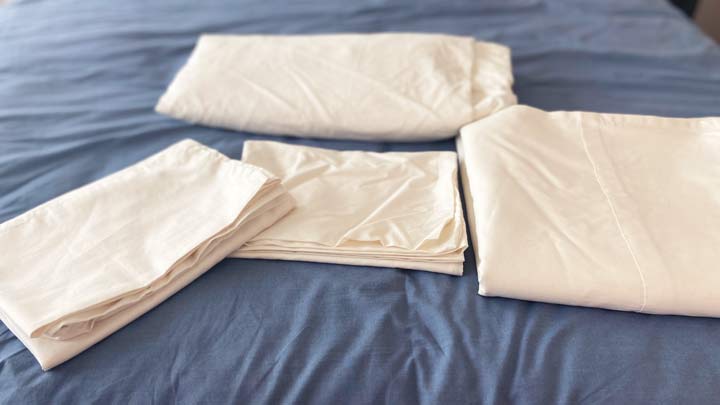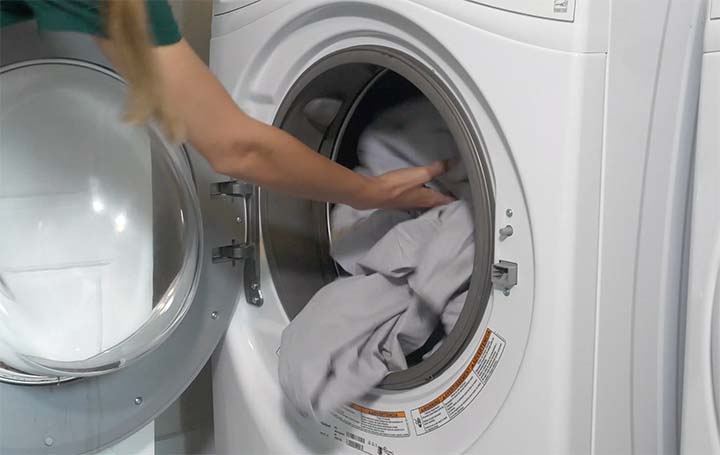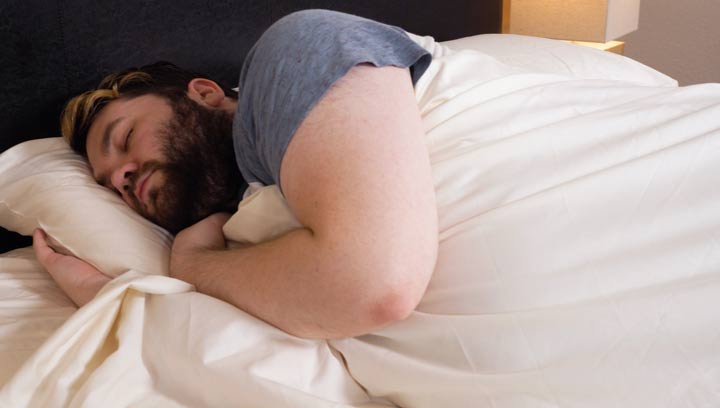Buying bedding can be overwhelming with so many options available including size, fabric, color, thread count, and weave. You may have stumbled upon the term “percale” and wondered what exactly it means.
Percale is a weave that uses a crisscross design with a typical one-over, one-under pattern, which tends to be more snug than the standard type of plain weave. Percale is known for its remarkable quality and durability. It’s great for those who sleep warm and who love that just-off-the-clothesline, cool, crisp feeling. Percale is smooth on the skin and has refreshing breathability because air can easily flow through the tightly woven junctures.
Percale has a matte look, no sheen, with a silk-like feel and luster. It typically has at least a 180 thread count per square inch (although most people agree that between 200-400 threads per square inch are ideal).
What Is Percale Made Of?
Percale is often woven from 100% cotton and sometimes is seen in blends with cotton, Tencel, rayon, bamboo, or synthetic fibers. High-quality percale is made from extra-long or long-staple yarn, which has a smoother feel on the skin and prevents snags and pills as you might find in shorter yarn fibers.

What Does Percale Feel Like?
Percale has a firm yet soft, smooth, and light feel to it, similar to the feel of a just pressed woven button-down shirt. This is achieved by the signature tight weave, which creates its unique cool, crisp, and delicate feel while still being soft to the touch and lightweight. When percale is made from a single-ply versus multi-ply thread, the feel is softer and lighter weight.
Benefits of Percale
Percale has excellent durability and is easy to care for. Percale starts out smooth to the touch and gets softer after washing. Some of the best percale sheets use extra-long or long-staple cotton, like Egyptian or Supima, which increases their softness factor and longevity.
Breathability and Cooling Properties
Percale is a great choice for those who tend to overheat at night or for those who like climbing into a cool bed with taut-fitting sheets. When it comes to Percale, though, a moderate thread count (200-400) is often preferred because it allows more air to flow through the weave.
Durability
Percale is a sturdy weave and can withstand frequent, long-term use. It washes well without pilling, snagging, or tearing. This durability is thanks to the one yarn over and one yarn under weave, and the mid-range thread count.
Thread count refers to the amount of vertical and horizontal threads. Manufacturers sometimes try to get a higher thread count number by twisting together thinner strands of thread as if it were one, and then they can increase the thread count number to make it more appealing to consumers. But, in actuality, as the thread count rises, the sheets are more susceptible to snags, rips, and pills because they become more fragile.
Get Softer with Every Wash
Like some things, percale is known to get better with age and use. In addition, single ply, as opposed to multi-ply threads, will produce softer and more durable percale bedding wash after wash.

Cotton Percale vs Cotton Sateen
Percale and sateen are both woven fabrics, but they differ in the type of weave. Cotton percale offers one thread over, one thread under pattern, while sateen uses a three or four over and one under construction. This variation creates a different feel, tightness, and temperature regulation. Percale is best for hot sleepers, while sateen tends to keep you warmer while you sleep.
Percale vs Egyptian Cotton
Percale refers only to how cotton (or a cotton blend) is woven. Egyptian cotton is a type of cotton that grows exclusively in Egypt along the Nile River, where the climate encourages the plant to bear exceptionally long fine fibers that are used to create luxurious fabrics. Some of the most sumptuous Egyptian cotton sheets will use either percale or a sateen weave.
Percale vs Linen
Linen is a specific type of fabric made from the flax plant’s fibers (although linen is also used as the word to describe bedding in general.) Linen, like percale, is durable and great for hot sleepers because the weaves allow for breathability. Linen is notorious for its airy yet textured feel and wrinkly look—which many love. High-quality linen sheets can be more expensive because of the additional time and labor it takes to process and weave the flax fiber into the linen fabric.
Percale vs Bamboo
Bamboo refers to a number of different textiles that are made from the bamboo plant— which is often referred to as eco-friendly because it grows easily and regenerates itself quickly. However, some types of bamboo fabrics are less environmentally sound because of the chemicals used in processing, while other types can be made using more sustainable and ethical practices.
Bamboo sheets, like percale, are great for hot sleepers and get high marks for both breathability and durability. Bamboo also has the moisture-wicking abilities that are often seen in natural fibers, while percale keeps us cooler by allowing airflow within the tightly woven fabric threads. Percale weave uses 100% cotton or cotton blends that may contain bamboo.

How to Wash Percale
Washing percale sheets is simple and they will come out of the wash even softer than when they went in. If you are like me and you try to avoid ironing wrinkled sheets, it’s helpful to untangle the sheets after washing and before they are tossed into the drier. This guide breaks down how to wash bed sheets in five simple steps.
Should I Buy Products Made with Percale?
Percale makes a great choice for bedding, especially for hot sleepers and for those who prefer to wrap up at night in crisp, smooth, and lightweight sheets. If this sounds like something that would appeal to you or whoever you’re buying sheets for, then yes, you should!
FAQs
Is percale cotton?
Percale is a type of weave that is often made using 100% cotton yarn or sometimes cotton blends with Tencel, rayon, bamboo or synthetic fibers.
Is percale soft?
Percale starts out crisp, firm, and smooth to the touch, like a cotton button-down shirt, and it will become softer after it is washed. It can initially feel a little stiff until it’s broken in, and the fibers soften with use and laundering.
Do hotels use percale or sateen?
Hotels tend to use percale because of its superior durability and comfort. Percale will continue to feel soft, fresh, and light, regardless of how many times it’s been washed.
Do percale sheets wrinkle?
Percale sheets do wrinkle, although cotton blends tend to wrinkle less. The best way to mitigate wrinkling is to buy a cotton blend or to put the bedding in the drier on lower heat, and when it is done, immediately make the bed.
Is percale good for hot sleepers?
Percale is great for hot sleepers. The standard one thread over, one thread under weave allows for ample airflow that will help keep you cool while you sleep. Look for a thread count of 200-300 for optimal cooling support.
